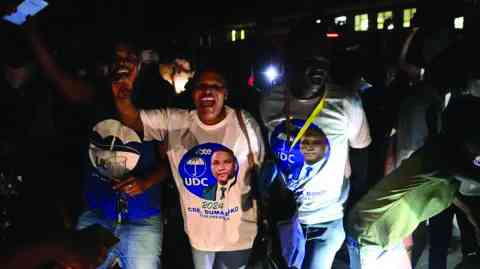
IN a continent where democracy often faces challenges, Botswana recently offered an inspiring example of what democratic ideals can look like in practice.
When Botswana's opposition political parties formed a coalition and won the recent elections, it led to a smooth and peaceful transfer of power.
The sitting president conceded defeat, and life went on without disruption. This is not merely a political shift; it is an embodiment of democratic resilience, especially for families and communities, who wish for stability, accountability, and opportunities.
As a Zimbabwean woman, observing Botswana’s democratic maturity brings both hope and reflection on how democracy can shape a family’s life.
Here is an exploration of the implications for Zimbabwe and how, on a practical level, democracy can empower families to thrive and pursue dreams.
Democratic ideal in Botswana
Botswana’s election was a pivotal moment, a textbook example of how democracy should work. Elections were conducted fairly, citizens voted freely, and the sitting president accepted the outcome with grace.
In many places, elections can bring about violence or even social upheaval, so to witness Botswana’s smooth transfer of power is inspiring. This is more than just a victory for the opposition; it is a victory for democracy itself.
- Zimcodd red flags wage erosion
- Village Rhapsody: Zimbabwe needs to reduce teen pregnancies
- Community trailblazers: Chipo Gozho: An inspiration to today’s women
- Sherwood Golf Club reopens for live shows
Keep Reading
Peaceful transitions as democracy’s bedrock: For democracy to serve people meaningfully, it must ensure peaceful transitions. By accepting the election result, Botswana's outgoing administration acknowledged that power lies with the people. As former President of Botswana Seretse Khama once said, "Democracy is not a matter of routine elections, but the heart of respect for the will of the people". His words resonate here, as the election highlights that democracy is not only about the right to vote but also about respecting that vote.
What this means for Zimbabwe’s democratic journey: Zimbabwe has faced considerable political and economic challenges over the years, with periods where democracy seemed fragile. For many Zimbabweans, the question of whether a government will honour democratic principles is not abstract — it is deeply personal. A government accountable to its people creates the conditions for jobs, healthcare, education, and security, essential for families to prosper. In Botswana’s example, Zimbabweans can see a model where the outcome of elections, whether victory or defeat, is respected, laying a foundation for stability.
Making life work for families
For Zimbabwean families, democracy is not just about elections but about how life can be improved through leaders that are accountable. Families are looking for practical ways to survive and thrive, even when political and economic circumstances are tough.
Botswana’s example shows that a government committed to democratic principles can create a stable environment where families can work, educate their children, and access healthcare without the constant shadow of political turmoil.
Creating economic stability
Botswana's democracy has led to relative economic stability, a key factor for families looking to build their lives. When governments are accountable and transparent, corruption tends to decrease, and resources are allocated more fairly.
This is crucial in Zimbabwe, where families often bear the burden of an economy that has been historically unstable. A functional democracy creates conditions where businesses can thrive, foreign investments increase, and local entrepreneurs feel encouraged to start ventures.
This economic stability is vital for families trying to earn an honest living and plan for the future.
Economic stability means parents can focus on work without the constant fear of hyperinflation or job losses. With stable incomes, families can afford essentials, invest in education for their children, and save for unexpected expenses.
It empowers families to dream beyond mere survival, envisioning a future where their children have opportunities to grow and contribute to society.
Education
In a democracy where leaders are accountable, education becomes a priority, not just a privilege. Botswana has consistently invested in its education sector, ensuring that children, regardless of background, have access to quality learning.
For Zimbabwean families, education is often seen as the primary path to a better life. However, economic challenges have strained Zimbabwe’s education system, leaving families grappling with school fees and limited resources.
A stable democratic environment allows a government to prioritise education without misallocation of funds or neglect. When children receive quality education, families feel hopeful and assured that they are building a foundation for their children to have a better future. Educated children contribute to the economy, uplift communities, and break cycles of poverty.
Healthcare and social services
In democratic countries, healthcare and social services often receive significant attention, as leaders are aware that their success depends on delivering essential services.
Botswana has managed to implement healthcare programmes that have improved life expectancy and reduced child mortality. In Zimbabwe, families face significant challenges accessing healthcare, especially in rural areas.
For democracy to work for Zimbabwean families, healthcare must be prioritised. When healthcare is accessible and affordable, families are empowered to lead healthier lives. A parent can work without the fear of sudden medical expenses bankrupting the family.
It also means children grow up in healthier environments, allowing them to learn, play, and develop fully. A government committed to healthcare can provide the resources for mothers, children, and elders to access medical attention, enhancing the overall quality of life.
Lessons for Zimbabwe
Botswana’s recent election serves as an example for leaders and citizens alike. For Zimbabwe, the peaceful transition signifies the strength that comes from respecting the people’s voice, fostering a culture of service, and nurturing transparent institutions.
Zimbabwe’s leaders can see that a government rooted in democratic ideals naturally aligns with citizens’ interests and delivers on promises that matter to families.
As citizens, Zimbabweans can feel inspired by Botswana’s journey and continue to demand accountability from their leaders. Citizens have the power to push for change that prioritises education, healthcare, and economic stability, the cornerstones of a healthy democracy.
This can be achieved through peaceful advocacy, civic engagement, and by holding elected officials accountable to their promises.
Personal reflections
As a Zimbabwean woman, the example set by Botswana’s recent election resonates deeply. Women bear a unique burden in times of political and economic instability.
When healthcare systems falter, it is often women who must find solutions to keep their families healthy. When education systems are inadequate, mothers work tirelessly to give their children opportunities.
Women across Zimbabwe are resilient, resourceful, and dedicated to their families, and they deserve a government that values their contributions by ensuring a stable, fair society.
Watching Botswana’s democracy in action reinforces my belief that a government committed to the people creates conditions where women and families thrive.
Botswana’s example shows that peace, respect for voters, and an accountable government are more than ideals; they are practical necessities.
When democracy flourishes, families have a fighting chance to lead dignified lives and to dream beyond mere survival. In a democracy, there is room to hope, to plan, and to build a life of stability, regardless of one’s gender or socio-economic background.
The peace and respect shown in Botswana’s transfer of power offer Zimbabwean families a beacon of what’s possible and a reminder that democracy, when honoured, is the foundation upon which healthy, resilient societies are built.
Botswana’s recent election shows democracy as it should be: accountable, respectful, and reflective of the people’s will. For Zimbabwe, this example is a powerful reminder that democracy can create a stable environment where families have the foundation they need to thrive.
As a Zimbabwean woman, I see this not just as a political victory but as a call to envision a Zimbabwe where families are supported, women are empowered, and leaders serve with integrity.
As Zimbabweans, we must continue striving toward a democratic culture that empowers and protects all citizens. With leaders who prioritise education, healthcare, and economic stability, and citizens who demand accountability, Zimbabwe can build a society where every family has the chance to live with dignity, hope, and opportunity.
Until then, we are blessed to be a blessing (#B2BAB). We were here, becoming better, making our mark, and leaving our footprint as we make the world a better place!
Chirenje writes in her capacity as a citizen of Zimbabwe. Follow her on social media for more Lifezone with Grace conversations on Twitter: @graceruvimbo; Facebook: Grace Ruvimbo Chirenje; Instagram: @graceruvimbo











